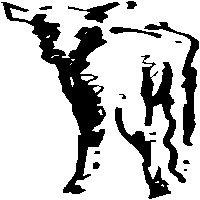



ANIMAL WELFARE: HELD BACK BY EUROPE?
After much lobbying from animal welfare campaigners, the EU agreed in Amsterdam, June 1997, on a Protocol that recognised animals as 'sentient beings' (creatures capable of feeling) rather than its previous classification 'agricultural produce'. This legally bound all EU members to "pay full regard to the welfare requirements of animals" when formulating and implementing Community policies on agriculture, transport, research, and the internal market.
The British Union for the Abolition of Vivisection hoped optimistically that this "could lead to an end throughout Europe of cruel farming systems such as battery cages and sow stalls...help bring live exports to an end."
Again, after much pressure, 11 March 1998 saw the Commission adopt a proposal from Agriculture Commissioner Franz Fischler to improve the welfare of laying hens and to adopt a general farm welfare Directive for the protection of animals kept for farming purposes. Owners and keepers were to "ensure the welfare of animals under their care and that they were not caused unnecessary pain, suffering or injury"* Member States that the conditions under which they were bred or kept complied with the provisions of an Annex to the Directive. However this Directive is only due to come into force on 31 December 1999.
The EU has also agreed to ban the veal crate -but only by 2007. And, in the year October 1995-
October 1996, nearly £200 million was spent by the EU on subsidising the export of live cattle to third countries - mainly, the Middle East and North Africa, where animal welfare is essentially non-existent. While the EU agreed in December,1997 that these subsidies (export refunds in practice) should only be paid where EU rules on the treatment of transported animals had been observed, how can they be
expected to monitor the treatment of animals ouside the EU?
In 1995, the Labour Party Conference voted unanimously to ban live exports. The then British
Government pleaded that "it is not enough for us unilaterally to set higher standards" and that
"A number of people have urged the Government to act unilaterally...legal advice is that would
[not] be compatible with European law".*
There was, in this respect, no real change of Government. A Ministry of Agriculture spokesman
said in November 1997 that banning live food exports under Article 36 of the Treaty of Rome
(which allows restrictions on trade on 'moral' grounds) was "...out of the question. A body of EU
legislation has been developed...does not recognise intra-Community trade as a special case..
would therefore be illegal to ban...judgement is awaited on a legal case" brought by the charity
Compassion in World Farming concerning veal crates.
The judgement was delivered on 19 March 1998 . It was that a British ban on the export of live
calves would be illegal - as existing laws from Brussels already laid down minimum standards,
Britain had no right to take unilateral action. Animal Welfare Minister Elliot Morley declared the
Government to be "strongly disappointed at the ruling" - with which they will of course comply.
There's also bad news on other fronts - while the EU did indeed pass a directive banning cosmetics
testing on animals in 1996, the threat of a legal challenge from the World Trade Organisation under
the GATT Treaty led to its being amended to allow animal testing when exporting to non-EU countries. (So much for the federalist propaganda as to how much clout EU membership gives Britain in trade!)
It was also ruled that the Cosmetics Directive would only be implemented from 1 January 1998 if the alternative tests gained official approval - which they didn't.The next review of these tests is not until 2000.
In 1997, the EU refused to ban the import of leghold-trapped fur from countries like Canada and
Russia; in the words of the RSPCA's European Officer David Bales, they'd "bowed to pressure
from fur exporting countries and sacrificed animal welfare for the sake of free trade".*
Finally, Christopher Booker (Sunday Telegraph, 5.7.98) revealed that an EU regulation forbidding the giving of certain medicines to horses would "set back the welfare of horses to the standards of the 1930s."The EU's excuse is that they classify horses as "food-producing animals" and insist on on expensive tests before drugs can be given to them. The fact that we in Britain don't eat horses means nothing to them - and "British ministers express sympathy but say there is nothing they can do.",
Substitute the word 'will' for 'can' and you'll get a more accurate statement! This is one of the many instances in which we in Britain could do more if not for the EU and its regulations. Only withdrawal from the EU will allow a British government to implement the decent standards the people want.
* = [abridged]
- About the author: Mark Taha is a freelance researcher into British and European history and politics. A National Committee member of CIB, he is writing in a personal capacity.
This page updated: 2 January 1999